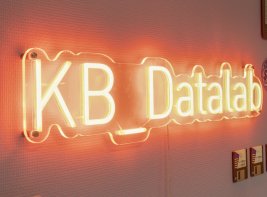Data services: APIs and downloads
Do you want to analyse 100 years of illustrations in digitised newspapers with machine learning software? Are you building an online application about Dutch writers in the 19th century? Or are you doing computational research on the development of the Dutch language?
The digital collections and metadata of the KB are available according to linked data principles, as bulk downloads, via APIs (Application Programming Interfaces) or via Wikimedia Commons. If copyright law allows it, anyone can use the data, free of charge and without conditions. If the material is copyrighted, access to the data for scientific research purposes is often possible. Read more about our data services.
Digital KB collections: data research and other purposes
The KB's extensive digital collections make it possible to use software to analyse large quantities of text, structured data or images from several centuries, in search of historical patterns or breaks. When did a word disappear from the Dutch language? When did the majority of illustrations in Dutch newspapers become photographs? When did people write positively or negatively about certain concepts or people?
All that data also offers unprecedented opportunities for making connections with other collections or data, or for bringing the history of the Netherlands to life through apps or online visualisations.
Access to open and non-open data
The method of access differs per collection or file and depends, among other things, on the legal status, the technical possibilities and the type of (meta)data. New forms of access are being developed on a regular basis.
Usually open data (i.e. not protected by copyright) can be downloaded without prior registration. For non-open data please contact @email and briefly describe what data you need and why. There is often an arrangement for research purposes. However, you may first have to sign a contract or access to the data may be limited to the KB building.
Secure environment
We offer two secure environments for accessing protected collections: a physical one and a digital one. Are you a researcher and do you wish to use digital KB collections that are not available outside the KB? The KB_Datalab in our reading room might be a solution. The KB_Datalab has two workspaces available where, under certain circumstances, you can be granted access to these protected digital collections in a secure environment. For more information, see: KB_Datalab
Then there is SANE: a secure digital environment for analysing protected data. The KB developed this virtual environment with partners to make more data available for research. This too can be accessed under certain circumstances. For more information about SANE, see: SANE.
New possibilities
More and more humanities or social science research with a historical component makes use of the possibilities of Text and Data Mining (TDM), machine learning or forms of artificial intelligence. The KB's digital collections often form the basis of this research.
Every year, dozens of researchers use the KB's digital collections to pose their own advanced questions and perform analyses. In this way, the KB's digital collections are more often 'read' by software than by people. Digital collections of the KB also find their way to other (sub)search environments, such as (in random order) Nederlab, Europeana, CLARIAH, Netwerk Oorlogsbronnen or Golden Agents.
Linked data
The KB's collections contain millions of publications, such as books, newspapers and magazines. To make them easily accessible, they are described according to a set pattern. These descriptions of publications are called 'medadata'. To ensure that this data is optimally usable for researchers and services, the KB offers data in the form of linked data. Read more about this expertise of the KB.
Contact
For more information, please contact @email.



